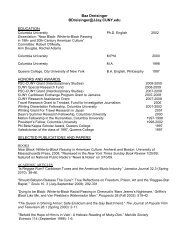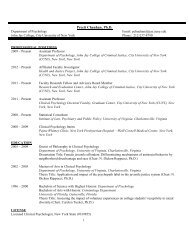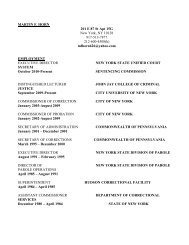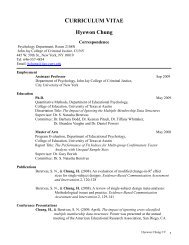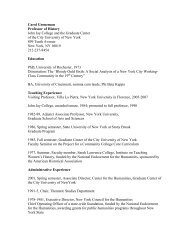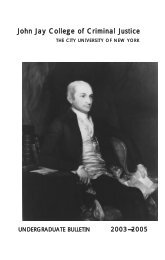Bulletin - John Jay College Of Criminal Justice - CUNY
Bulletin - John Jay College Of Criminal Justice - CUNY
Bulletin - John Jay College Of Criminal Justice - CUNY
Create successful ePaper yourself
Turn your PDF publications into a flip-book with our unique Google optimized e-Paper software.
Courses <strong>Of</strong>fered<br />
ECO 235 Finance for Forensic Economics<br />
3 hours, 3 credits<br />
Forensic Economics is the application of the general theories and<br />
methodologies of economics to the measurement of economic<br />
damages for use in legal settings. Topics that this course will cover<br />
include the financial behavior of the large corporation, security<br />
markets, stock market pricing and valuation, portfolio and risk<br />
analysis, and social applications of financial reasoning.<br />
Prerequisites: ECO 101 and Math 108 or equivalent<br />
ECO 245 International Economics<br />
3 hours, 3 credits<br />
Theories of international trade, exchange rate determination under<br />
fixed and flexible regimes, the international financial system and<br />
balance of payments accounting are introduced. The role of multinational<br />
corporations and foreign aid, as well as international<br />
institutions such as the International Monetary Fund, World Bank,<br />
International Labor Organization and the World Trade Organization<br />
are examined. Problems of unsustainable current account deficits and<br />
external debt for developing nations are explored. Trade and<br />
investment policies are examined from alternative theoretical<br />
perspectives, including debates over "free trade" versus "fair trade,”<br />
international financial system reform and the impact of globalization<br />
on national sovereignty and democratic governance. Lastly, the<br />
economies of selected developed, developing and transitional nations<br />
are surveyed.<br />
Prerequisites: ENG 101 and ECO 101<br />
ECO 260 Environmental Economics, Regulation and<br />
Policy<br />
3 hours, 3 credits<br />
The economic roots of environmental problems such as resource<br />
depletion, pollution, toxic wastes, and global warming are explored.<br />
The global issues of sustainable development, environmental justice,<br />
and the intertwining of poverty and environmental problems are<br />
studied. Different environmental standards and decision-making<br />
techniques are presented and their relative merits examined. The<br />
corrective potential of a variety of policies such as civil and criminal<br />
regulation, taxation, tradable permits, auditing, environmental impact<br />
requirements and international treaties are analyzed. The<br />
implications of alternative theoretical perspectives for public policy<br />
are considered.<br />
Prerequisites: ENG 101 and ECO 101<br />
ECO 265 Introduction to Public Sector Economics<br />
3 hours, 3 credits<br />
Contemporary economic problems provide the context for analyzing<br />
the economic role of government from a variety of perspectives. The<br />
need for government intervention due to external effects of market<br />
transactions, public goods, equity considerations, market power and<br />
stabilization needs is explained. The impact upon us of government<br />
spending, taxation, money creation and regulation is examined. A<br />
variety of techniques such as present valuation and cost benefit<br />
analysis are presented. The economic problems considered in the<br />
course will include such issues as housing, education, poverty,<br />
pollution, discrimination, government fragmentation, social security,<br />
and current fiscal, monetary and tax policy debates.<br />
Prerequisites: ENG 101 and ECO 101<br />
ECO 270 Urban Economics<br />
3 hours, 3 credits<br />
Why cities exist, how their characteristics change over time and how<br />
global and national urban networks function are analyzed in the<br />
course. Different means of financing city government and related<br />
issues such as the impact of globalization, decentralization of<br />
government and metropolitan fragmentation on urban finances are<br />
explored. A variety of urban problems such as sustainability of<br />
cities, housing, health, education, crime, poverty, pollution, labor<br />
conditions, discrimination and transportation are studied. The impact<br />
76



